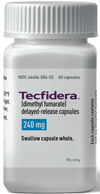When it launched in October, Biogen's ($BIIB) Tecfidera commercial notched a milestone as the first TV commercial to address relapsing multiple sclerosis (RMS). However, since then the ad has become a point of contention in some MS circles with commentary playing out on blogs and social media.
 |
| Biogen's Tecfidera ad |
On one side are MS patients who say that the ad showing an active young woman--hiking, swimming and going to an amusement park--is an unrealistic portrayal of the amount of energy they have and what medication can do. On the other side are MS patients who are glad to see the condition on TV because it raises awareness.
"What on earth are you thinking?" wrote MS patient blogger Laura Kolaczkowski in a post written as a letter to Biogen on her "Inside My Story" website. She wrote: "Multiple sclerosis treatment shouldn't be shown as another 'tiny blue pill' ad like Viagra, but that is certainly the message that screams at me from this one. You show everyone that if we take this blue pill once a day, we can do anything.
"I am the first one to be encouraging, but your ad takes it beyond that. Even people with 'normal' health will not hike, swim and go to the fair in one day and still look so good; someone with MS would be out of the day before they hit noon."
She was also one of more than 125 commenters at iSpot.tv, many of whom said the ad was unrealistic. Some even called for it to be pulled off the air. An iSpot spokesman said, when asked about the volume of Tecfidera comments, that it was a large response compared to most ad feedback.
Still, other MS patients, including some in the iSpot comment section, said they appreciated that MS is getting TV airtime. Novartis ($NVS) did run TV-style online video for its relapsing MS drug Gilenya in 2013 as part of its well-received "Hey MS, Take This" campaign, but the Tecfidera ad is the first to actually hit television, Biogen notes.
Randy Patrick, an MS patient who runs the "Must Stop MS!" social media effort, has heard negative comments from other patients about the ad, but said in an interview, "I didn't mind it. I was just glad to see an MS campaign on TV."
He is a young MS patient and said he identifies with the woman in the ad because he can do those things. However, Patrick said he also understands MS patients have a spectrum of capabilities and others might be put off by the imagery.
Patient community groups have also noticed the commentary.
Jack Barrette, CEO of patient social network WeGo Health, said via email, "We are definitely hearing loud and clear from our MS patient community leaders that some television DTC is presenting an unrealistic view of people with MS, and that they are forced to handle not just outrage but confusion about these medications. Top leaders of our community would replace huge TV spends with in-depth digital programs that can share the true patient voice."
 And of course, Tecfidera maker Biogen has also noticed. The company conducted research with more than 250 RMS patients in developing the ad, and at the time it launched, posted an article on its site noting the intent of the TV ad to "address a sticky knowledge gap in the RMS community: awareness of treatment options. The treatment advances over the last two decades have been profound--but important information hasn't caught up to patients. Biogen research shows that most people living with RMS don't readily know about all available treatment options."
And of course, Tecfidera maker Biogen has also noticed. The company conducted research with more than 250 RMS patients in developing the ad, and at the time it launched, posted an article on its site noting the intent of the TV ad to "address a sticky knowledge gap in the RMS community: awareness of treatment options. The treatment advances over the last two decades have been profound--but important information hasn't caught up to patients. Biogen research shows that most people living with RMS don't readily know about all available treatment options."
On Wednesday, a Biogen spokeswoman acknowledged that the company has seen comments about the ad and said, "We knew that the ad wouldn't appeal to everyone, but we did try to take steps to make sure that it could connect with the community." She added that the TV campaign will continue running for the next few months with Biogen's ongoing intent to "elevate awareness of this chronic condition on the national level."
The October Biogen web posting pointed out the specific work it did with patients: "Throughout the development of this ad, we took every step possible to ensure that we connect with the MS community as appropriately, accurately and genuinely as possible."
Like any advertising, not everyone will agree with the contents, said Brian Loew, CEO of Inspire, an online patient engagement platform. In fact, many consumers have simply become used to ads being unrealistic. Slim and healthy-looking people eat junk food and beautiful people use skin cream and hair products with incredible results--that's just advertising, right?
"I don't think there's an average response; different people respond differently," Loew said. "Consumers of drug advertising don't react differently than other consumers. In other words, we're all skeptical consumers who are able to inform ourselves from multiple sources. We see an ad, and some of us roll our eyes and some of us are interested in the information."
However, when it comes to healthcare and more serious conditions, Loew agreed that the stakes are higher.
"I think the stakes are much higher in MS than in, for example, what kind of soap I buy," he said. "But there's not an average response--some people will react strongly and some people won't. Often times you have bias because you're hearing from people who are happy or unhappy. You're not hearing from the larger chunk of people who just continue to go about their day."
- see the Tecfidera ad and commentary at iSpot.tv
- read blogger Laura Kolaczkowski's column
- look at Biogen Insight on the Tecfidera ad launch
- read the New York Times story about the Gilenya online ad